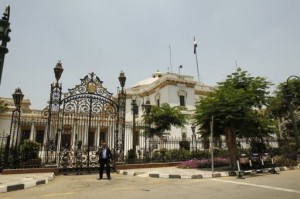
(AFP Photo)
The new draft for the Parliamentary Elections Law “radically conflicts with the ultimate goal of popular forces, who took to the streets on 25 January 2011 and 30 June 2012, of achieving democratic transition,” a group of political movements said on Saturday.
The committee tasked with amending the Political Participation Law and the Parliamentary Elections Law finalised and made public the draft of the latter legislation on Wednesday.
Al-Dostour Party, the Social Popular Alliance Party (SPAP), Al-Karama Party, Misr Al-Hurreya Party and Al-Tayar Al-Shaaby met on Saturday to discuss the new draft. The five movements later released a statement condemning the draft. The legislation was also criticised by the Egyptian Social Democratic Party (ESDP) and Misr Al-Qawia (Strong Egypt) Party in two separate statements.
The five movements warned that the new draft, if passed, would produce a parliament similar to the one voted on in 2010, before the toppling of former President Hosni Mubarak. The latter parliament, which included very few opposition members and almost non from the then popular Muslim Brotherhood, was seen as one of the sparks of the 2011 revolution.
“This draft leads to maintaining the circumstances which the people revolted against on 25 January,” the statement read, describing the draft as “catastrophic” in terms of democratic transition.
The ESDP called on the president, the cabinet and the committee tasked with drafting the proposed law to “reconsider” the legal text. Otherwise, the party warned of the formation of a “deformed parliament” which only serves the interests of the privileged and wastes the chance of “returning to the right democratic path”.
The five movements warned in their joint statement that ignoring political movements’ demands could push citizens to find “other channels of expressing their needs”.
The signatories of the joint statement criticised Article 3 of the constitution, which states that 80% of parliament members will be elected individually. The parties stated that this formation would deprive the “underprivileged” of their chance of winning the elections, given that the costs of running for the elections individually would be “no less than EGP 1m.”
“This draft anchors dictatorial rules and allows for a monopoly over legislation in Egypt by the businessmen, the rich, the big tribes in the countryside, and those with social influence,” the statement read.
The movements also noted that leaving only 20% of the parliament seats to be elected through electoral lists would negatively affect partisan life. The ESDP stressed the importance of electing at least 50% of parliament members through electoral lists, warning that otherwise, the country would return to the pre-25 January practices which weakened legislation.
All the movements also condemned the “absolute electoral lists”, to be used in the coming parliamentary elections, as per the new draft. Such a system allows only one list (of partisans, individuals or both) to win all 120 seats allocated to lists. During the 2011 parliamentary elections, the list seats were picked through “relative lists”, where members on each list were elected based on the percentage of votes each list received, therefore allowing representation of a larger variety of parties.
The movements also condemned increasing the number of parliamentary seats, to include 600 elected members and 30 appointed ones. The five movements warned that this would “weaken the parliament’s effectiveness and its members’ chance to carry out their parliamentary duties to hold investigations and discussions over proposed legislations”.
The ESDP criticised Article 5 of the draft law, which creates quotas for different minorities, to be applied during the coming parliamentary elections only. The draft stipulates that each electoral list should include: at least three females, at least three Copts, at least two farmers and/or labourers, at least two youth members, at least one handicapped member and at least one member from Egypt’s expatriates.
The ESDP said restricting such quotas to the lists seats would be “negative discrimination”.
Interim President Adly Mansour issued a presidential decree on 14 April, creating a committee to amend the Political Participation Law and the Parliamentary Elections Law in preparation for the coming parliamentary elections.
During the drafting process, the activities of the committee which drafted the law were criticised by political parties for not being inclusive.

